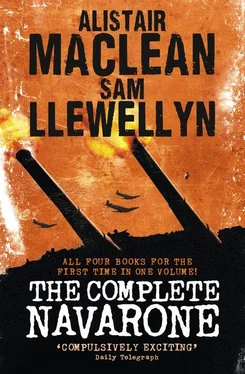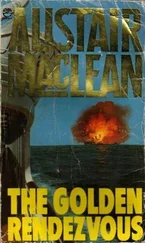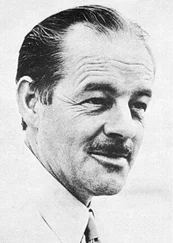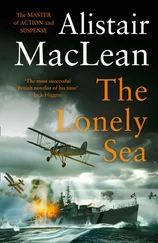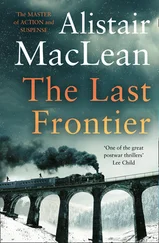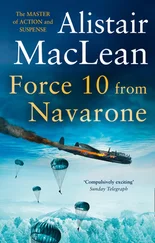‘Hands up!’ said a voice in Greek. A woman’s voice. There was the metallic sound of a cocking lever. The hands relaxed.
Wills fell forward on to the parapet, groping for his Schmeisser. ‘Back off,’ he said. Then, remembering, ‘Jolly boating —’
‘Captain Wills,’ said a voice he recognized: a soft voice that might have been a purr or a growl, there was no way of being sure. Andrea’s voice. ‘Captain Wills, you should not sit in a place where you can be seen against the sky.’
‘Go away,’ said the woman’s voice. Clytemnestra’s voice. ‘Leave him alone, you great stupid ox.’ She was beside Wills now, cradling his head in her hands. ‘Can’t you tell who is on your side and who isn’t? Are you blind?’
‘Understandable error,’ said Wills, checking that his head was still there. ‘Bit of luck you were coming out of the church, though.’
Clytemnestra snorted. ‘Do you think I would leave you alone in the night?’ she said. ‘I have been watching you for the past two hours.’ She put an arm around his waist. ‘If you can’t look after yourself, someone else will have to.’
Andrea cleared his throat. ‘I hate to interrupt,’ he said. ‘But tell me, how much did you know about the life and habits of your late brother?’
In the view of Josef Koch, this island was a filthy place. Only a week ago, he had been pleased. After a winter chasing partisans around Yugoslavia the prospect of a little sun, sand and sea had been very enticing. But once he was actually here it had all gone wrong, thought Koch, hauling at the wheel, dragging the lorry’s bonnet round yet another hairpin bend. The people on this island had the temperament of angry hornets, and most of the women had moustaches. If they were not fighting you, they were fighting each other. The Wehrmacht were bloody useless. The boffins were boffins: bloody useless too. Josef Koch’s mind floated back to happier times: Bosnia, a wood with half-a-dozen partisans wired to the trees, him and a couple of privates slinging a rope over a branch, setting up the seesaw: a novelty, the seesaw, a thing of Josef’s own invention. The idea was that the terrorist stood on one end of the seesaw, and Josef stood on the other. Josef was a big man: fat, some called him, if they dared. The terrorist, of course, had a noose round his neck tied to the branch above. The idea was that the private soldiers would tell Josef jokes, and try to make him laugh so he lost his balance, and the terrorist’s end of the plank went down, leaving the terrorist kicking, but not alive, not after five minutes, anyway. The other thing Josef liked to do was walk towards the terrorist, so the terrorist’s weight brought the plank down slowly, slowly, tightened the noose round the neck, while all the while Josef explained the error of the terrorist’s ways, and the terrorist died, twisting and jerking on the rope, looking into Josef’s thick-lipped grin and bulging, pink-veined eyes. It was fantastic, the fun you could have with a simple plank. Though obviously the terrorists did not enjoy it so much.
Josef sighed. He liked hanging people. He had had a goodish time in Parmatia last week, but that had been a small-scale operation. It sounded like there would be more such work soon, though. There had been fighting in the mountains, and trouble at the works, and … well, the Boss was severely ticked off, and when the Boss was ticked off, the best place to be was far away. So it was absolutely no hardship for Josef Koch to be driving this truck, on the Boss’s orders, down the coast road to Parmatia to bring back some suspected partisan sympathizers from the lockup.
Next bend. Haul the wheel, change down a gear, foot flat on throttle –
There was a stone in the road. More a boulder, really. Josef stamped on the brake. The lorry halted. That was another thing you got, on this island. Lumps of mountain all over the road. There was a crowbar in the back. Sighing, Josef opened the door, swung his legs out, and slid down from the cab.
That was when the peculiar thing happened.
As his boots hit the road, he found himself grabbed from behind, scruff of neck and seat of pants. All of a sudden he had no control over his own destiny. A boot landed with shattering violence on his back, and the dark ground was passing at horrid speed under his eyes as he headed for the verge.
Not that there was a verge.
At the edge of the road was a strip of loose stones, on which the Feldwebel bounced once, face first. Beyond the strip of stones was silence, moving air, and far below, the shift of the sea.
The Feldwebel found that he was falling down a cliff. He screamed. The scream lasted exactly the time it took to fall two hundred feet on to sharp rocks.
On the road, the lorry stood, engine purring. Andrea helped Wills drag the driver’s mate to the side of the road and roll him over into the dark, while Clytemnestra wiped the blade of her long knife on a tuft of dry grass. The driver’s mate had bled surprisingly little. Wills possessed himself of the man’s camouflage smock and took the wheel. Clytemnestra climbed into the middle, and Andrea squeezed his mighty bulk in next to her, lit a cigarette, and slumped back, hands on the grips of his machine pistol. ‘Parmatia,’ he said.
Beyond the windscreen, the world began to move, white stone, pine and juniper, cliff and gorge, gleaming in the light of the blacked-out headlights. The dark puddle on the road behind faded into the blackness of the night.
They headed for Parmatia.
From the top of the ladder in the house by the Acropolis church, Miller could see Mallory at the door. The knocking persisted. Carstairs was up through the hole in the ceiling now. Miller hauled up the ladder, fast. As he pulled its foot through the hole, the door opened, loosing a flood of blue-white light into the squalid ground floor. It picked out straw, rubbish, and Mallory. Mallory with his hands on his hips, glaring at the three soldiers outside, Schmeissers levelled: Mallory shouting in German, walking towards them, out into the light …
And that was the last Miller saw of him, because the ladder was up and he was lifting it to the next ceiling, where there was another hole. The floor creaked alarmingly as Spiro headed for the ladder. Miller picked out the joists with a pencil flashlight, shooed Carstairs to the ladder foot, then went after him. Spiro was already climbing, at a speed truly remarkable in one so recently bedridden. Carstairs went after him, more groggily.
At the top, they were in a low attic, whose ceiling was the underside of the roof tiles. ‘Leave the ladder,’ said Miller, and started to push aside the heavy clay half-cylinders. After five minutes’ steady work, his head broke through, and he was spitting worm-eaten beam and ancient bamboo lining into the night air.
In front of him was a low white parapet. Beyond the parapet was the roof of the church, sweeping at one end up to the cupola, and at the other to a belfry, open to the air, with a three-foot parapet running around its edge. The belfry would be accessible from the church, as well as over the roof.
Miller very much liked the look of the belfry.
He took off more tiles, scrambled through the roof, and pulled the other men after him. Then he replaced the tiles, and led them across the parapet to the dark slope of the church roof.
‘Shit,’ said Spiro. ‘I don’ likes highness.’
‘It’s not high,’ said Miller.
‘Looks high to me,’ said Spiro.
‘Go,’ said Miller.
‘No,’ said Spiro.
It was quite obvious to Miller that the Greek meant what he said. Hard to blame the guy, really. He had done plenty already, and everyone drew the line somewhere.
Pity it was right here, though.
Something barged Miller aside. It was Carstairs: Carstairs with something held out in front of him, something with a faint sheen under the stars. A very faint sheen: the sheen of the blued-steel blade of a killing knife, nine inches of razor-sharp unpleasantness. ‘Ow!’ said Spiro.
Читать дальше
Конец ознакомительного отрывка
Купить книгу
